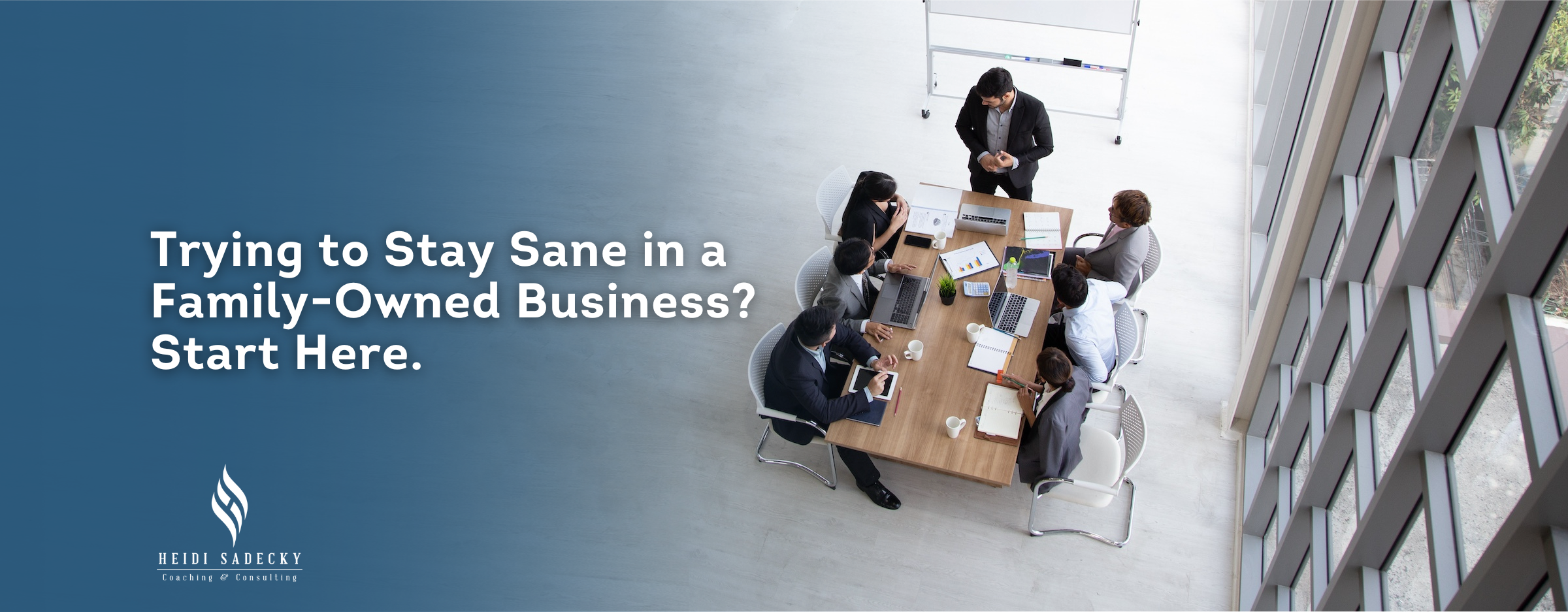Trying to Stay Sane in a Family-Owned Business? Start Here.
By Heidi Sadecky, PCC – Executive Coach & Director, Townsend Leadership Program
If you’re leading inside a family-owned business, you know the pressure is real.
Your role isn’t just about strategy and operations—it’s about navigating family history, traditions, expectations, and emotions that don’t always fit neatly into a spreadsheet. When things get tense, it can feel like you’re walking a tightrope between being professional and protecting your peace.
In moments like these, one skill rises to the top:
Attunement—without agreement.
Why This Works in Family Businesses
Family dynamics are layered. You might be having a meeting about budgets, but what’s really happening underneath is unresolved tension from a decision made five years ago—or even childhood dynamics still playing out in adult form or meeting room.
It’s easy to fall into the trap of trying to “set the record straight” or defend yourself. But in emotionally charged situations, facts rarely fix things. What does? Feeling heard.
Attunement doesn’t mean you’re giving in. It means you’re creating space for connection by being aware of and understanding someone’s emotions. And connection is what opens the door to influence, even when conflict is on the table.
What It Sounds Like in the Real World
Let’s say your cousin, who’s also a partner in the business, pushes back on a new hiring decision.
They say:
“You didn’t even talk to me about this. It’s like my input doesn’t matter.”
You might feel the urge to jump in with your reasons or remind them that you did mention it briefly last week. But that’s not going to lower the temperature.
Instead, try:
“It sounds like you’re feeling left out of this decision. I can see how that would be frustrating.”
“You’ve invested a lot here—of course you’d want to be in the loop.”
You're not agreeing with their take. You’re showing them that their experience matters. And when people feel seen, they’re far more likely to soften and actually hear your side.
From there, you can add:
“Let me walk you through how this decision came together. I want us to be on the same page moving forward.”
What Happens When You Don’t Attune
When you skip validation, emotions tend to escalate. Defensiveness grows. The business suffers.
But when you slow down long enough to say, “I get why this matters to you”—even if you see things differently—you keep the conversation human. And in family businesses, that human connection is the heartbeat of everything.
Wisdom from Dr. John Townsend
Dr. Townsend puts it simply:
“People don’t change when they feel judged. They change when they feel seen.”
In high-stakes, high-emotion environments, becoming attuned creates the space for understanding, trust and change—even if you never fully agree.
You Don’t Have to Do This Alone
The truth? Leading inside a family business is one of the most emotionally demanding roles out there. It’s why so many of our Townsend Leadership Program (TLP) members say that their group has been a lifeline—a place to be real, process conflict, and get support from other leaders who truly get it.
If you’re tired of trying to hold it all together alone, you’re not weak—you’re wise. Leadership was never meant to be a solo act.
I’ve worked with so many leaders who feel stuck between honoring their family and honoring themselves—and I want you to know, you’re not alone. It is possible to lead with strength, compassion, and clarity—even in complicated relationships. The key is learning to stay connected without losing your voice. If that’s something you’re working on, keep going. And if you need support, our TLP community is here to walk with you.
Final Thought: The next time things heat up in a conversation with a family member at work, remember: You don’t have to agree to attune. You just have to listen.
That one shift can change the whole dynamic.
Heidi Sadecky is a trusted executive coach who partners with leaders to unlock their full potential. Her mission is to help leaders understand their unique behaviors and decision-making patterns, empowering them to avoid costly mistakes and lead with confidence, authenticity, and emotional intelligence. Heidi holds a master’s degree in Organizational Leadership and multiple high-level certifications, including Emotional Intelligence (EQi and EQ360). Learn about workplace training programs here.


